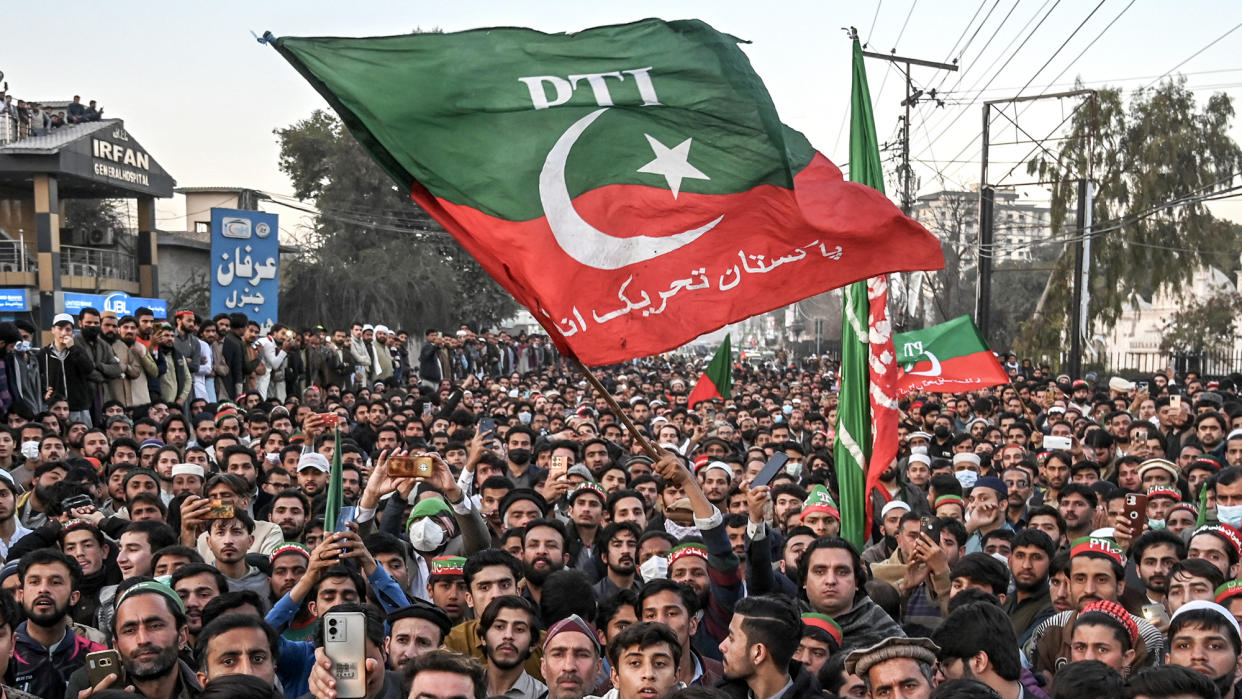Is Pakistan on the cusp of a revolution?

- Oops!Something went wrong.Please try again later.
A six-way coalition will form the next government in Pakistan, ensuring the party of former prime minister Imran Khan will not take power despite getting the most votes in last week's election.
The announcement followed "days of wrangling and political horse-trading", said The Guardian, after Khan's Pakistan Tehreek-e-Insaf (PTI) won the most votes – but not enough for a majority – "despite military opposition and a state-led crackdown".
The election may have featured "state-of-the-art avatars and TikTok videos, but the question it poses evokes an old theme", said The Economist. That is: "How long can the country's relentless decline continue before it triggers a revolution, outside intervention or – hope against hope – political renewal?"
What did the commentators say?
The people of Pakistan "spoke clearly" on 8 February, wrote Mosharraf Zaidi in The News International. PTI loyalists, who were forced to stand as independents after the party lost its electoral symbol days before the vote, won 93 seats out of 266. In the circumstances, said Zaidi, this is "nothing short of a political miracle".
Amid allegations of widespread vote-rigging and manipulation, "there is no escaping the party's arrival as the big, immovable object in Pakistani politics". But despite registering the most votes of any party, and boasting the most popular politician in Pakistan as its figurehead, it finds itself shut out of power.
PTI has described the new ruling alliance – led by the Pakistan People's Party (PPP) and Pakistan Muslim League-Nawaz (PML-N), which had been predicted to win the election comfortably – as "mandate thieves".
In truth, the election had been a "fiasco before any votes were cast", said The Economist. "For decades the generals have ruled nuclear-armed Pakistan directly or via a stage-managed democracy featuring a recurring cast of corrupt dynastic parties," said the newspaper, and they will welcome this "shabby outcome".
It was an election "arranged by the Generals and the Judges", agreed Dr Mahboob A. Khawaja on Counter Currents.
Yet despite the seemingly iron grip of the military, judiciary and historic political clans on the levers of power, last week's result shows that Khan continues to loom large. If the army and opposition thought his sentencing to more than a decade in prison would weaken his influence then they have been sorely mistaken. On Friday, Khan, the former national cricket captain in a country where the sport is wildly popular, used an AI-generated video to deliver a victory speech from his cell.
PTI's success "against the odds" in this "deeply flawed" election sends "an emphatic message from Pakistani citizens: they are tired of being led by self-serving political elites and the military's arbitration", said the Financial Times (FT).
What next?
Pakistan is "mired in an economic crisis" that has seen annual inflation hit 28%, said the FT. The country's debt burden has risen sharply and it narrowly avoided defaulting last year thanks to an International Monetary Fund (IMF) bailout.
Incoming prime minister Shehbaz Sharif has pledged "revolutionary steps" to bring the country out of its economic malaise, but the new coalition government will take power "under a cloud of public distrust and questions of legitimacy", said The Guardian.
One scenario forecast by The Economist is that Khan's "young, often urban and now-enraged supporters rise up" as they did after his arrest in May 2023 when they stormed military buildings in Lahore. "Another is that the Pakistani Taliban, a local variant of the militant movement, takes advantage of the political turmoil and stirs up further violence."
The election's outcome ultimately "makes the country even less governable", said the FT. It predicted that the new government may need to pursue unpopular austerity policies in order to secure new IMF loans in the spring, all against the backdrop of mass protests by Khan's supporters.
There are "no easy fixes for Pakistan's long-standing economic and security troubles, regardless of who is in power", the paper said. The first step would be to empower voters to hold leaders to account with fair elections.
"With this stunning election result, a long-term reckoning over how Pakistan ought to be governed has begun."

